Kiss Me Kate
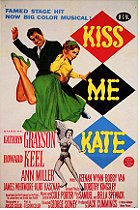 Posted : 12 years, 1 month ago on 9 May 2013 09:27
(A review of Kiss Me Kate)
Posted : 12 years, 1 month ago on 9 May 2013 09:27
(A review of Kiss Me Kate)George Sidney’s direction is a little too lifeless for the wit and vibrancy on display in the songs and cast. There’s no wit or imagination in his direction, nothing but a lot of point-and-shoot. Donen could have brought a lot of life to “From This Moment On,” which is already a highlight for introducing the world at large to the choreography of Bob Fosse, Cukor could have dramatized “I Hate Men” far better, and Minnelli would have made “Too Darn Hot” a sensual number for Ann Miller. As they remain in the move, they’re quite good, but that is thanks to the performers involved and not their director.
And what a cast! I know I’ve been hard on Kathryn Grayson in past reviews, but she’s quite good here. Nothing amazing, but she finally manages to carry a scene with some skill and calms down her operatic singing enough to use a more “pop” voice. She sometimes dips too far into making a Cole Porter tune into a Giacomo Puccini scale-buster, but generally she’s quite effective here. Howard Keel is a handsome fellow, who looks lovely in a pair of tights, and he’s a big ham. This is actually quite perfect for both parts that he’s tasked with playing as the actor playing Petruchio and the role itself in the musical. But the film is stolen by Ann Miller, given something to do besides play the sex-crazed sidekick, and Tommy Rall, who is ridiculously handsome and a fantastic dancer. Their relationship dynamic has more erotic heat and better chemistry than the one between Grayson and Keel, and they get the larger portion of better dance numbers, for obvious reasons.
Flawed but filled with enough panache and energy for two films, Kiss Me Kate was a joy to watch. The musical numbers are great, the songs are fantastic, the performances are generally good across the board, and it’s only the too clean direction that holds the thing back from greatness. No matter, it may be a shelf away from the best of the best, but it’s still a damn fine choice.
 0 comments, Reply to this entry
0 comments, Reply to this entry
I Could Go on Singing
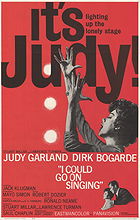 Posted : 12 years, 1 month ago on 9 May 2013 08:06
(A review of I Could Go on Singing (1963))
Posted : 12 years, 1 month ago on 9 May 2013 08:06
(A review of I Could Go on Singing (1963))It’s a pity then that the plot mechanics couldn’t match her iron will and defiant spirit. Singing lays on just about every cliché damaged superstar story you can think of – estranged child, rekindled romance, the conflicts between personal and professional struggles are just a few of the ones we can find in this film. If it’s never great, then it’s also never really awful. She manages to generate a believable relationship with Gregory Phillips, who plays her estranged son, and Dick Bogarde, who plays his father and her long-lost lover. In fact, many of the scenes between Garland and each of the men have a quiet, delicate poignancy and real emotional tug thanks to their subtle acting. None better than the climax where Bogarde meets Garland in the hospital after a bender, tries to talk her into performing and leaving him and their son alone, and she reacts with a tirade about how no one can tell her when or how to sing, it is her gift and she’ll use it how she wants. It’s a lacerating moment in which everything comes together to create a tension and dramatic perfection missing from much of the rest of the film. And the final scene, which sees Garland belting out the titular song, is heartbreakingly poignant for an entirely different reason. Harold Allen and E.Y. “Yip” Harburg wrote “Somewhere Over the Rainbow,” which made Garland a star. Now here she is in her final film ending a movie with another one of their songs, it’s a bittersweet circular moment and the lyrics take on a strange new meaning knowing that she would die a few years after this.
 0 comments, Reply to this entry
0 comments, Reply to this entry
A Child Is Waiting
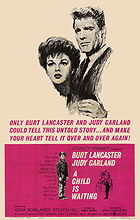 Posted : 12 years, 1 month ago on 9 May 2013 08:06
(A review of A Child Is Waiting)
Posted : 12 years, 1 month ago on 9 May 2013 08:06
(A review of A Child Is Waiting)The behind the scenes drama is interesting, but the fact that Child turned out remotely watchable and enjoyable is even more interesting. Cassavetes wanted to make one of his more experimental, realistic social dramas, while Kramer and the stars were pure studio-system dynamic. The film does live with this tension and remains uneven in tone, slipping too far into melodramatics one moment and turning on a pin towards a kind of cinema-verite. Too sentimental by turns and also rather harsh, if realistic, A Child Is Waiting is fractured, but saved by the three central performances.
Their dynamic is fairly routine – two educators with opposite beliefs in how to deal with children eventually learn to meet in the middle – but Burt Lancaster and Judy Garland were great dramatic actors. Garland wants to mother the children while Lancaster thinks that strict discipline and teaching them to be self-reliant where possible is better for them. It’s hard to argue with either approach, and their meet-in-the-middle agreement is probably the best treatment. Lancaster’s striking features can harden and appear steely very easily, but his eyes convey the caring and nurturing at the heart of his character. Garland, in a rare but excellent purely dramatic performance, is all vulnerability, melancholia and a leaking faucet of love and warmth for the children. Bruce Ritchey is extremely convincing as Rueben, who the film dubs “retarded,” but I thought of him as a more high-level autistic child than anything else. Most of the film revolves around him, and he holds it up without resorting to precociousness or cutesy mannerisms. That he is able to appear in a scene with either of the big name stars and not dim into the background is fairly astonishing in its own right.
There’s much to like about A Child Is Waiting, but I really wish Kramer hadn’t interfered so damn much. He gilds the lily in obvious places, creates a film that, in Cassavetes words, wasn’t bad but too sentimental. Gena Rowlands turns up, of course, in a brief performance as the boy’s mother and it is in those moments that the Cassavetes touch is most obviously felt. It’s a better film because it doesn’t easily adhere to the conventions of the “social problem” pictures that Hollywood and Kramer, in particular, fairly often rolled out. What’s most striking and lingering is how these kids are free from self-pity, but society feels nothing but pity for them, choosing instead to lock them away elsewhere and ignoring the underlining issues at hand. Well, I guess the more things change….
 0 comments, Reply to this entry
0 comments, Reply to this entry
Boogie-Woogie Dream
 Posted : 12 years, 1 month ago on 6 May 2013 12:24
(A review of Boogie-Woogie Dream)
Posted : 12 years, 1 month ago on 6 May 2013 12:24
(A review of Boogie-Woogie Dream)Filmed in 1941 but unreleased until 1944, Boogie-Woogie Dream came out right as Lena Horne became a radiant star and highlights her in only her second on-screen appearance. In this early form she is still a vibrant and glowing presence, and trying to make her appear as a plain Jane waitress seems an effort in futility the moment she smiles. Her glamour fills up the screen at even this early stage, and it's always a pleasure to hear her sing.
But Dream is even more notable for being the only film footage of Albert Ammons and Pete Johnson. The trio play a kitchen staff who daydream about becoming big-time nightclub sensations, only to awaken from the group dream to obtain the opportunity after being overheard singing and playing the piano by a wealthy patron of the club they work at. It's pure fluff, but the amount of talent on display is staggering. The short is in the public domain and can be watched in its entirety [Link removed - login to see].
 0 comments, Reply to this entry
0 comments, Reply to this entry
Atlantis: The Lost Empire
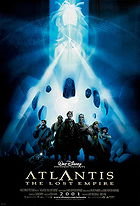 Posted : 12 years, 2 months ago on 2 May 2013 06:55
(A review of Atlantis: The Lost Empire)
Posted : 12 years, 2 months ago on 2 May 2013 06:55
(A review of Atlantis: The Lost Empire)Consider me a (minor) member of the cult for this film. Atlantis: The Lost Empire is something completely different visually and story-wise from Disney, the studio that typically traffics in personality deficient princesses and cutesy anthropomorphic adventures filled with singing, dancing and homogenized romance. I find it enjoyable and enjoy that it dares to be different, but the film is still riddled with problems.
The most striking thing about Atlantis is how it looks. Borrowed heavily from the drawing style of comic book artist Mike Mignola, the film is made up of sharp angles and blocky figures. The look evokes something of Fleischer’s Superman, Jack Kirby’s expressive angularity and steam-punk creativity, so we’re halfway there in crafting a wholly engrossing animated film. The thing looks absolutely wondrous and unique.
The narrative plays fast with pulp conventions, giving us steam-punk submarines, ancient civilizations, incredible power sources, and characters defined more by broad types than real personalities. As a fan of science fiction, I would be happy watching an animated series about this world, or a series of well-done sequels. There’s tremendous potential for expansion here, yet the film speeds through several of the more interesting events and character development potentials to craft rousing action sequences.
While the quick pace saves us from putting off finding the mythical city until too late in the film for anyone to care, this same rapid-fire propulsion through the narrative leaves us with half-formed characters and thinly plotted motivations. The United Colors of Benetton crew feels like lip service to creating diversity since none of them are given more than a gimmick which defines them. I could have easily done without the French mole-man character and used that time to explore of the Atlantian king’s back story, he seemed far more interesting than the quick exit he’s dealt in the film.
It also seems skimpy for the filmmakers to have created an entirely new language for the characters to speak and then jettison it once we discover that Atlantis was a multi-cultural world that somehow knows modern American English. I guess they were too chicken to force little kids to read subtitles. Somewhat understandable, I suppose, as the film is clearly playing for an older audience than the typical all-ages product they produce.
No matter, because while the script and development of the characters may be lacking, the action sequences are first rate, especially the third act which is just one action sequence after another. The Leviathan attack is beautifully animated, incredibly thrilling, and manages to take out a vast array of static characters in very quick succession. The explorer group goes from a few hundred characters to a small handful and a large group of armed guards. They really pulled no punches in detailing the dangers and consequences in that sequence.
It helps to have a game vocal cast. The only big names are Michael J. Fox, Leonard Nimoy and James Garner, who turn in performances that are both committed and playful. Fox seems perfectly suited to Milo’s nebbish yet tough character, and Garner gets too go full on deliciously crazy as the film’s surprise villain. The studio wisely uses Garner’s built-in goodwill and history of action films to trick the audience. Nimoy doesn’t get much to do, but he has one of the great voices for an animated film. I really wish the writers gave him more to do and play with as his brief time is quite appealing. An ensemble of well-known voice actors fills out the rest of the cast, which is a smart move from Disney as recent years found indifferent vocal work coming from big name movie stars really harmed their final products. Their voices have appeared in practically every TV show, video game and movie over the past twenty or so years.
While Atlantis: The Lost Empire may be imperfect, at least it gave Disney the chance to go full-out with a Jules Verne-like pulp science fiction adventure story. The studio takes to this format quite well. I wonder if this had been a hit, either critically or commercially, if Disney would have produced more science-fiction epics? The ultimate failure of this, and Treasure Planet a few years later, caused the studio to stick with what works, which explains the upswing in princess movies as of late.
 0 comments, Reply to this entry
0 comments, Reply to this entry
Show Boat
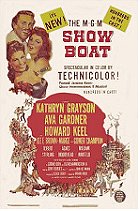 Posted : 12 years, 2 months ago on 2 May 2013 06:55
(A review of Show Boat)
Posted : 12 years, 2 months ago on 2 May 2013 06:55
(A review of Show Boat)Originally set to star Lena Horne in her dream role, and she would have been magnificent, MGM’s studio heads chickened out, rewrote the role, gave it to Ava Gardner (much to her confusion and horror) and left the movie adrift with only one paddle. They were afraid that audiences in 1951 wouldn’t be able to cope with an interracial marriage, a black actress in a leading role and cut out practically all of the material concerning race except for the scene where it is revealed that Julie is half-black. This leads me to ask: why even do Show Boat if you’re going to remove all of that material from the script? Removing this part of the script also removes much of the discussion of poverty, but I guess poverty doesn’t exist in the MGM movie universe.
What we’re left with the fairly uninteresting and soggy central romance between Magnolia and Gaylord. Gaylord has also been cleaned up and made less of an out-and-out bastard and more of a lovable scamp. It helps that Howard Keel plays him, he may not be a great actor, but he’s charismatic and charming, which goes a long way. Kathryn Grayson as Magnolia is a bit of wash. I cannot stand her trill voice and she’s not much of an actress, especially when compared to Ava Gardner, Agnes Moorehead and Joe E. Brown. Brown and Moorehead may not be given much to do, but they do manage to breathe some life into their characters and line readings. And Show Boat belongs to Gardner, she manages to stay afloat of every sentimental turn her character takes and does her best to give it some life and believability. Her voice may be dubbed, but her descent into alcoholism and poverty, however grossly glossed over and underwritten, makes us wish that the film had spent more time following her around instead.
While this Show Boat is more concerned with presenting as much sumptuous costumes and sets that MGM could manage to get up the screen, director George Sidney still manages to create a couple of scenes which hint at a greater movie lurking underneath. “Ol’ Man River” is, unquestionably, the best sequence in the whole film. Just watch it for yourself; you’ll see what I mean. And whenever Sidney manages to slyly refer back to the original novel/stage show’s depiction of black culture being appropriated by white entertainers, it gives off a bit of sparkle. Consider the scene where Julie teaches Magnolia the song “Can’t Help Lovin’ Dat Man of Mine.” After learning it, Magnolia will continue to use it as a signature song; she removes much of the soul and adds a slather of gooey emotionality to it.
So while the soul of Show Boat is missing and the emotions might be a little hollow, it does, on a technical level, offer much entertainment. The whole film feels like it was churned out of the musical factory, but every so often Gardner strikes a chord that reminds how underrated an actress she still is. A great beauty, yes, but she was never afraid to play emotionally lacerating scenes or even look a little ugly for the part. I didn’t hate it by any means, it just left me very cold.
 0 comments, Reply to this entry
0 comments, Reply to this entry
The Big Knife
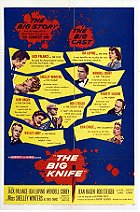 Posted : 12 years, 2 months ago on 2 May 2013 06:55
(A review of The Big Knife)
Posted : 12 years, 2 months ago on 2 May 2013 06:55
(A review of The Big Knife)Jack Palance’s artistic integrity as an actor isn’t a very burning issue, and The Big Knife is far better when detailing how his sordid past behavior is constantly coming back to haunt him, make a mess of his family life and constantly silenced by the studio for the sake of his image. This doesn’t come into grand effect until roughly halfway through act two of the film which wears its stage origins loudly. Once the backstabbing and manipulations of seedy past deeds comes into the film it becomes more alive and engrossing. But the problem is that this is only a secondary story and the main thrust concerns his artistic identity and his marital strife.
The Big Knife remains watchable thanks to a top-notch cast lead by Jack Palance and Ida Lupino. Each of them gives a fierce, tough performance that anchors the film in some semblance of reality even as it spins off into melodrama and artificial theatrics. Rod Steiger’s studio executive is less a character than an overacted plot device who strikes a bum note each time he comes onscreen. Jean Hagan is far better in an extended scene as a promiscuous wife of Palance’s best friend who will keep his secrets safe if he gives into her wishes. Shelley Winters is the real standout and manages through sheer force of will to create the best scene in whole film. During a late night conversation in which Palance tries to charm and seduce her into keeping her big mouth shut about any gossip she knows about him, Winters delivers a monologue decrying her treatment as a piece of meat, a glorified call-girl who must give out sexual favors in exchange for the promises of an eventual screen-test or bit part, which never come. Winters appears to go deep into her personal emotions and reveals an emotional wound that lingers on the viewer.
Aldrich often bit the hand that fed him in his choice of stories, and he tailored them in documentary-style lighting. The effect is that the whole film looks and feels harsher for it. There’s no “pretty” studio gloss, no glamorous filters to make anyone look beyond human in their beauty. It’s no surprise that this scathing portrait of Hollywood’s top brass left many a member of the community un-amused and led to Aldrich’s eventual blacklisting. It’s such a pity that the script is a bit of a wooden, occasionally overwritten mess – The Big Knife could have been a slam-dunk masterpiece.
 0 comments, Reply to this entry
0 comments, Reply to this entry
Anna Lucasta
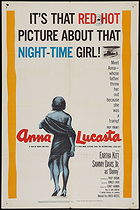 Posted : 12 years, 2 months ago on 29 April 2013 09:16
(A review of Anna Lucasta)
Posted : 12 years, 2 months ago on 29 April 2013 09:16
(A review of Anna Lucasta)The story is pure melodrama – Anna was kicked out as a teenager for being too fast and loose, she now lives in San Diego as a prostitute near the naval bases. Her family gets word that a wealthy family friend’s son is coming to visit, they want him to find a wife and ask the family to help out, they decide that Anna would be a great catch for him and before you know it she’s pulled off the streets and getting a makeover to be more presentable. Long simmering familial secrets and dramas come to a head, especially the unspoken abuse that Rex Ingram’s father probably committed towards Anna. Along the way she falls in love, runs away with her sailor lover, but returns in the end knowing that constantly finding salvation and good-times in drink and random men is no way to live.
The real reason to watch the film is the cast. Ingram is always a large presence on the screen – he enters not with a small reaction but a loud BANG. He’s a drunken violent menace of a man, a brute and Ingram is frankly terrifying and mesmerizing in the role. Sammy Davis Jr. brings conviction to the role of a playboy sailor who thinks of Anna as only a good time and not much more. He doesn’t entirely sell the role, perhaps because he is physically too slim and it requires someone with a more intimidating presence, but he makes up for it in emotionally nailing the part.
Anna Lucasta belongs to Eartha Kitt through and through though. It’s a star-making role and performance, yet it didn’t launch her into films. It doesn’t seem fair, as her work here is totally committed and awards worthy. Her Anna is a tigress, capable of being a purely sexual and purring creature one moment and turns one a dime into a ready to pounce predator. If for no other reason, watch it for Eartha Kitt’s glorious central performance.
 0 comments, Reply to this entry
0 comments, Reply to this entry
A Canterbury Tale
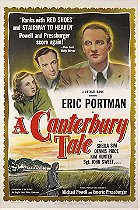 Posted : 12 years, 2 months ago on 29 April 2013 09:16
(A review of A Canterbury Tale)
Posted : 12 years, 2 months ago on 29 April 2013 09:16
(A review of A Canterbury Tale)You see, this film vaguely takes the notion of Chaucer’s infamous story and reconstitutes it as a parable in WWII. The film is pure propaganda made to remind the British forces and citizens what it was exactly that they were fighting to protect. It utilizes a lot of first time actors like Sheila Sim and John Sweet, and they’re awkward, mumbling, shrill and pretty terrible in their parts. Sweet seems to be overdoing his lines while Sim is often nervously rushing through. Using an American to explain pastoral England and why it’s worth loving isn’t a bad idea – seeing the familiar through fresh eyes and all that – but it’s also not terribly interesting in how it’s presented. Lots of scenes that go nowhere and padded moments that don’t bother with the main “plot” only make the situation worse. By the time we get to the cathedral in Canterbury, I had mentally checked out of the film just hoping it was all going to be over soon.
While it is tedious to sit through, there are many glorious sights to behold. The opening trick shot of a hawk transforming into an airplane is one. Powell & Pressburger would go on to create more stunning visual tricks and images in their later films, but this one is still a nice little bit of magic. And Kent is a positively lovely space to take in. I understand why they would film so many scenes with locals improvising daily routines because the location is just stunning. In the end, this is what the film is about and maybe it would have been better spent with minimal dialogue and doing something Terrence Malick-like before he even began to compose his symphonic fantasias.
 0 comments, Reply to this entry
0 comments, Reply to this entry
Fritz the Cat
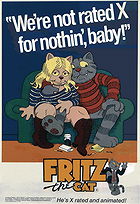 Posted : 12 years, 2 months ago on 29 April 2013 09:16
(A review of Fritz the Cat (1972))
Posted : 12 years, 2 months ago on 29 April 2013 09:16
(A review of Fritz the Cat (1972))Racial identity and physical characteristics are grossly oversimplified or too on-the-nose in their renderings. Pigs as cops, crows as black people, bunnies as slutty co-eds, it’s like someone’s straightjacketed perversions have been given reign to violate your mind and eyes. But the most egregious thing is the depiction of any and all female characters. None of them are able to appear on the screen without flashing their anthropomorphic breasts at some point in time, no matter how unnecessary and distracting. It begins to feel like someone’s suppressed sexual desires and misogynistic views of women are slowly leaking out onto the screen. A radical terrorist bangs on the table and her breast pops out, no reason is given at all and nothing is made of it. Every female character only exists to be sexualized and commoditized by Fritz/Bakshi’s leering eye.
Fritz is only of passing interest for, and made its entire infamy on, being the first X-rated cartoon. And forty years later, that’s pretty much all the interest it has going for it. I failed to see the humor involved and knew after about ten minutes that I was probably going to hate this movie and regret watching it. I did, but I’m not sure if regret is what I feel. More like general confusion over how it’s managed to remain in some small way a part of the popular conversation about animated films.
 0 comments, Reply to this entry
0 comments, Reply to this entry
 Login
Login
 Home
Home 95 Lists
95 Lists 1531 Reviews
1531 Reviews Collections
Collections